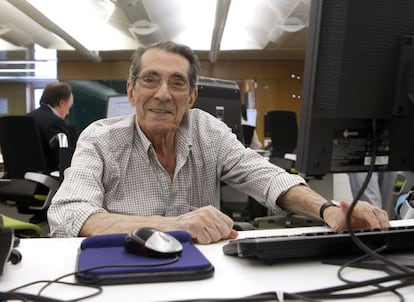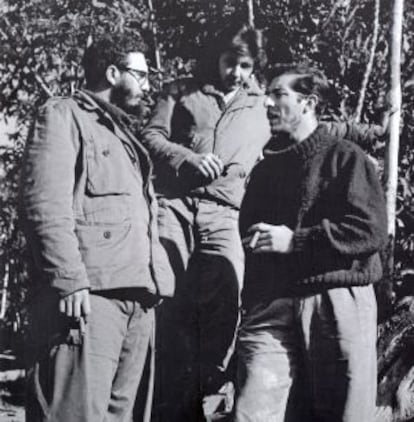“I had to feel history in my bones”
Veteran Spanish journalist Enrique Meneses left his "sordid" country in the 1950s to rove the world, covering major events such as the Cuban revolution

Carrying a heavy bag filled with cameras and rolls of film, Enrique Meneses slowly walks across Mese Selimovica Boulevard, better known as Sniper Alley in downtown Sarajevo. It is July 1993 and the rooftops are full of Serbian gunmen. His colleagues urge him to go faster. But Meneses cannot because of his lung condition. So he continues at his own pace, wearing a helmet and a bulletproof vest, picking his way around burnt vehicles, containers and cement blocks to get to the other side. Once there, the click of his camera is added to the sound of the rifles.
He returns to the Holiday Inn when night is about to fall. His room is on the sixth floor, but the elevators don't work and going up the stairs is too exhausting for him. Yet he must. Inside the room, only the bathroom has electricity. Meneses turns on an old radio set and immediately identifies the singer: besides the war, these people also have to put up with Julio Iglesias singing in English!
This is the second year of the Bosnian war, at the height of the madness, and Meneses has lied to his wife, telling her he was going on safari to Kenya. Instead, he flew here with a press pass from Tiempo magazine aboard a UN military plane, to find a nightmarish situation with which he is not completely unfamiliar - he has seen his share of military action in the past.
But this time he is 64, suffers from emphysema, and his long career has already made him a witness to some of the greatest milestones of the 20th century. And so, Meneses decides that Sarajevo under siege will be his last adventure as a photo reporter.

Fast-forward to the present. Meneses is 83. His face sports insolent wrinkles etched by personal experiences, a thin-lipped mouth that keeps producing one story after another, blue eyes gazing out alertly from behind delicate glasses, a wide forehead, hair that refuses to turn white, and a nose permanently connected to an oxygen bottle. This proud face, now worn out from disease, belongs to one of the leading figures in contemporary Spanish journalism.
On this particular afternoon, Meneses is looking quite dignified, although his bandaged feet are very swollen and resting on a small red chair. He seems comfortable in his own living room, a laptop in front of him ("my window on the world"). He returned from hospital a week ago.
"Disease to me is a natural thing. It is an obstacle. But it is also the chance to overcome that obstacle. I have already overcome two cancers. And if a third should come along, well here I am, ready for it. The first was a colon cancer, and the second was lung cancer. But look here, I'm 83. I'm not so selfish as to want to live to 95. No. That seems excessive. If I do live to 95, well hallelujah, but if not, I'll consider it absolutely normal. There are seven billion of us on this planet and if we don't push over to make some space... And besides, after everything I have done, what else is there left for me to do?"
Then Meneses, sitting in his brown armchair, launches into an account of some of his most memorable experiences as a journalist.
It was the afternoon of August 28, 1947 and a collective shiver ran down Spain's spine when a bull named Islero gored the famous matador Manolete at Linares, in Jaén province. Meneses was in Madrid when he heard the news on the radio and he felt here was his big chance for his first journalistic adventure. He went out, hailed a cab, and paid 450 pesetas (under three euros) for the 300-kilometer ride. It was night when he got there. He managed to see the doctor who treated Manolete, talked to a few people on the street. The bullfighter died in the early hours of the morning.
I'm not so selfish as to want to live to 95. No. That seems excessive”
Meneses went back to Madrid and wrote his story, which he sold to Prensa Mundial for 150 pesetas, or 90 cents of a euro. It was published in Spain "and two or three Latin American newspapers."
It made him feel like a million bucks. He was still three months shy of 18, and already a journalist. But Meneses had someone to learn from: both his parents were journalists, although they wanted their son to be a diplomat. "But I couldn't, because I say things right to people's faces, and a diplomat cannot do that," he confides.
He was born on October 21, 1929, just when the New York Stock Exchange was crashing. The Spanish Civil War caught him in Biarritz in southern France, where he was vacationing with his family. Because of their republican past, the Meneses went straight to Paris, where they would later experience the German occupation during World War II. Later still they moved to Portugal, and when Enrique was a teenager they returned to Spain.
"It was a sordid country, with a very plain, provincial kind of journalism that only discussed three things: soccer, bullfighting and soap operas. Maybe that is why I went for the Manolete story."
Maybe that is also why he decided to leave. In 1954, after two years at the Spanish edition of Reader's Digest, Meneses went to Marseille and bought a one-way ticket to Alexandria. He explored Egypt and made a living teaching French and Spanish, and dubbing tourist documentaries. Then, one day, he thought he would see Africa "from Cairo to Cape Town." He covered 27,000 kilometers in four months, returning to Cairo just in time for the Suez Crisis. This was the beginning of his freelance work for the prestigious magazine Paris-Match.
Back in Madrid in 1957, he decided to go to Costa Rica to stop an arranged marriage between his cousin and a "very important man." Before that, he thought he would stop in Cuba to check out rumors about a "little revolution" being prepared in the Sierra Maestra mountains by a "bunch of bearded fellows." Paris-Match thought it was a good idea. Sending his photo equipment inside a crate of whisky and then flying down to Santiago, he managed to penetrate the sierra, succeeding where many had failed and becoming the first journalist to meet the revolutionaries. He met Fidel Castro, his brother Raúl, Ernesto Che Guevara and 100 other members of the Cuban revolution. For one month, his exclusive reports made headlines across the globe and have since become prized historical material.
That experience became a "passport" that opened the doors to other major assignments. For two years he covered armed conflict in the Middle East, then lived in New York; attended the historical Washington march against racial discrimination, in which Martin Luther King Jr gave his famous "I have a dream" speech; covered John F. Kennedy's funeral; and finally returned to Spain to start magazines. He made radio and television programs and wrote books.
"Wherever history was being made, I wanted to be there to feel it in my bones. There are thousands and thousands of faces that I have committed to memory, like shadows of a life full of joy and sorrow, of silliness and suffering, of pettiness and heroism," he wrote in his 2006 memoir, Hasta aquí hemos llegado (or, This is as far as we've got). "I regret nothing that I did, but I do regret what I could have done but did not."
Tu suscripción se está usando en otro dispositivo
¿Quieres añadir otro usuario a tu suscripción?
Si continúas leyendo en este dispositivo, no se podrá leer en el otro.
FlechaTu suscripción se está usando en otro dispositivo y solo puedes acceder a EL PAÍS desde un dispositivo a la vez.
Si quieres compartir tu cuenta, cambia tu suscripción a la modalidad Premium, así podrás añadir otro usuario. Cada uno accederá con su propia cuenta de email, lo que os permitirá personalizar vuestra experiencia en EL PAÍS.
¿Tienes una suscripción de empresa? Accede aquí para contratar más cuentas.
En el caso de no saber quién está usando tu cuenta, te recomendamos cambiar tu contraseña aquí.
Si decides continuar compartiendo tu cuenta, este mensaje se mostrará en tu dispositivo y en el de la otra persona que está usando tu cuenta de forma indefinida, afectando a tu experiencia de lectura. Puedes consultar aquí los términos y condiciones de la suscripción digital.








































